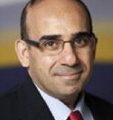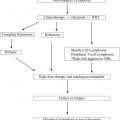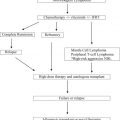Myelodysplastic syndromes are one of the most common hematological disorders in the elderly. Therefore, an increase in the prevalence of de novo but also of secondary forms after prior chemotherapy or radiotherapy, respectively, is anticipated within the next years. Allogeneic stem cell transplantation is considered the only potentially curable therapy, but many patients are not eligible because of age or comorbidities. Reduced-intensity conditioning regimens have improved early tolerability of the procedure, although late effects remain a challenge in the care of these patients. However, hypomethylating agents have become available as alternative therapeutic approaches with a moderate toxicity profile.
Finally, should transplantation be a potential curative option in elderly patients with MDS? Yes it should be, but within prospective trials investigating the success of allogeneic SCT compared with other treatment options. In the absence of prospective trials, a careful individual selection should be done; patients should be stratified according to comorbidities, performance status, and disease risk. Chronic GVHD and relapse are still the major challenges after SCT. Therefore, special attention should be paid to posttransplant care in terms of GVHD management, MRD monitoring, and prevention of relapse.
References
- 1. Martino R., de Wreede L., Fiocco M., et al: Comparison of conditioning regimens of various intensities for allogeneic hematopoietic SCT using HLA-identical sibling donors in AML and MDS with <10% BM blasts: a report from EBMT. Bone Marrow Transplant 2013; 48: pp. 761-770
- 2. Greenberg P., Cox C., LeBeau M.M., et al: International scoring system for evaluating prognosis in myelodysplastic syndromes. Blood 1997; 89: pp. 2079-2088
- 3. Greenberg P.L., Tuechler H., Schanz J., et al: Revised international prognostic scoring system for myelodysplastic syndromes. Blood 2012; 120: pp. 2454-2465
- 4. Della Porta M.G., Alessandrino E.P., Bacigalupo A., et al: Predictive factors for the outcome of allogeneic transplantation in patients with myelodysplastic syndrome stratified according to the revised International Prognostic Scoring System (IPSS-R). Blood 2014; 123: pp. 2333-2342
- 5. Sorror M.L., Maris M.B., Storb R., et al: Hematopoietic cell transplantation (SCT)-specific comorbidity index: a new tool for risk assessment before allogeneic SCT. Blood 2005; 106: pp. 2912-2919
- 6. Deschler B., Ihorst G., Platzbecker U., et al: Parameters detected by geriatric and quality of life assessment in 195 older patients with myelodysplastic syndromes and acute myeloid leukemia are highly predictive for outcome. Haematologica 2013; 98: pp. 208-216
- 7. Gore S.D., Fenaux P., Santini V., et al: A multivariate analysis of the relationship between response and survival among patients with higher-risk myelodysplastic syndromes treated within azacitidine or conventional care regimens in the randomized AZA-001 trial. Haematologica 2013; 98: pp. 1067-1072
- 8. Saber W., Le Rademacher J., Sekeres M., et al: Multi-center biologic assignment trial comparing reduced intensity allogeneic hematopoietic cell transplant to hypomethylating therapy or best supportive care in patients aged 50-75 with intermediate-2 and high risk myelodysplastic syndrome: Blood and Marrow Transplant Clinical Trials Network #1102 study rationale, design and methods. Biol Blood Marrow Transplant 2014; 20: pp. 1566-1572
- 9. Koreth J., Pidala J., Perez W.S., et al: Role of reduced-intensity conditioning allogeneic hematopoietic stem-cell transplantation in older patients with de novo myelodysplastic syndromes: an international collaborative decision analysis. J Clin Oncol 2013; 31: pp. 2662-2670
- 10. Alessandrino E.P., Porta M.G., Malcovati L., et al: Optimal timing of allogeneic hematopoietic stem cell transplantation in patients with myelodysplastic syndrome. Am J Hematol 2013; 88: pp. 581-588
- 11. Platzbecker U., Schetelig J., Finke J., et al: Allogeneic hematopoietic cell transplantation in patients age 60-70 years with de novo high-risk myelodysplastic syndrome or secondary acute myelogenous leukemia: comparison with patients lacking donors who received azacitidine. Biol Blood Marrow Transplant 2012; 18: pp. 1415-1421
- 12. Cutler C.S., Lee S.J., Greenberg P., et al: A decision analysis of allogeneic bone marrow transplantation for the myelodysplastic syndromes: delayed transplantation for low-risk myelodysplasia is associated with improved outcome. Blood 2004; 104: pp. 579-585
- 13. Jabbour E., Mathisen M.S., Garcia-Manero G., et al: Allogeneic hematopoietic stem cell transplantation versus hypomethylating agents in patients with myelodysplastic syndrome: a retrospective case-control study. Am J Hematol 2013; 88: pp. 198-200
- 14. Brand R., Putter H., van Biezen A., et al: Comparison of allogeneic stem cell transplantation and non-transplant approaches in elderly patients with advanced myelodysplastic syndrome: optimal statistical approaches and a critical appraisal of clinical results using non-randomized data. PLoS One 2013; 8: pp. e74368
- 15. van Gelder M., de Wreede L.C., Schetelig J., et al: Monosomal karyotype predicts poor survival after allogeneic stem cell transplantation in chromosome 7 abnormal myelodysplastic syndrome and secondary acute myeloid leukemia. Leukemia 2013; 27: pp. 879-888
- 16. Deeg H.J., Scott B.L., Fang M., et al: Five-group cytogenetic risk classification, monosomal karyotype, and outcome after hematopoietic cell transplantation for MDS or acute leukemia evolving from MDS. Blood 2012; 120: pp. 1398-1408
- 17. Sierra J., Perez W.S., Rozman C., et al: Bone marrow transplantation from HLA-identical siblings as treatment for myelodysplasia. Blood 2002; 100: pp. 1997-2004
- 18. Warlick E.D., Cioc A., Defor T., et al: Allogeneic stem cell transplantation for adults with myelodysplastic syndromes: importance of pretransplant disease burden. Biol Blood Marrow Transplant 2009; 15: pp. 30-38
- 19. Lim Z., Brand R., Martino R., et al: Allogeneic hematopoietic stem-cell transplantation for patients 50 years or older with myelodysplastic syndromes or secondary acute myeloid leukemia. J Clin Oncol 2010; 28: pp. 405-411
- 20. Alessandrino E.P., Della Porta M.G., Bacigalupo A., et al: WHO classification and WPSS predict posttransplantation outcome in patients with myelodysplastic syndrome: a study from the Gruppo Italiano Trapianto di Midollo Osseo (GITMO). Blood 2008; 112: pp. 895-902
- 21. de Witte T., Suciu S., Verhoef G., et al: Intensive chemotherapy followed by allogeneic or autologous stem cell transplantation for patients with myelodysplastic syndromes (MDSs) and acute myeloid leukemia following MDS. Blood 2001; 98: pp. 2326-2331
- 22. Scott B.L., Storer B., Loken M.R., et al: Pretransplantation induction chemotherapy and posttransplantation relapse in patients with advanced myelodysplastic syndrome. Biol Blood Marrow Transplant 2005; 11: pp. 65-73
- 23. Gerds A.T., Gooley T.A., Estey E.H., et al: Pretransplantation therapy with azacitidine vs induction chemotherapy and posttransplantation outcome in patients with MDS. Biol Blood Marrow Transplant 2012; 18: pp. 1211-1218
- 24. Damaj G., Duhamel A., Robin M., et al: Impact of azacitidine before allogeneic stem-cell transplantation for myelodysplastic syndromes: a study by the Societe Francaise de Greffe de Moelle et de Therapie-Cellulaire and the Groupe-Francophone des Myelodysplasies. J Clin Oncol 2012; 30: pp. 4533-4540
- 25. Platzbecker U., Thiede C., Fussel M., et al: Reduced intensity conditioning allows for up-front allogeneic hematopoietic stem cell transplantation after cytoreductive induction therapy in newly-diagnosed high-risk acute myeloid leukemia. Leukemia 2006; 20: pp. 707-714
- 26. Schmid C., Schleuning M., Ledderose G., et al: Sequential regimen of chemotherapy, reduced-intensity conditioning for allogeneic stem-cell transplantation, and prophylactic donor lymphocyte transfusion in high-risk acute myeloid leukemia and myelodysplastic syndrome. J Clin Oncol 2005; 23: pp. 5675-5687
- 27. Lubbert M., Bertz H., Ruter B., et al: Non-intensive treatment with low-dose 5-aza-2′-deoxycytidine (DAC) prior to allogeneic blood SCT of older MDS/AML patients. Bone Marrow Transplant 2009; 44: pp. 585-588
- 28. Field T., Perkins J., Huang Y., et al: 5-Azacitidine for myelodysplasia before allogeneic hematopoietic cell transplantation. Bone Marrow Transplant 2010; 45: pp. 255-260
- 29. Itzykson R., Thepot S., Quesnel B., et al: Prognostic factors for response and overall survival in 282 patients with higher-risk myelodysplastic syndromes treated with azacitidine. Blood 2011; 117: pp. 403-411
- 30. Armand P., Kim H.T., Cutler C.S., et al: Prognostic impact of elevated pretransplantation serum ferritin in patients undergoing myeloablative stem cell transplantation. Blood 2007; 109: pp. 4586-4588
- 31. Platzbecker U., Bornhauser M., Germing U., et al: Red blood cell transfusion dependence and outcome after allogeneic peripheral blood stem cell transplantation in patients with de novo myelodysplastic syndrome (MDS). Biol Blood Marrow Transplant 2008; 14: pp. 1217-1225
- 32. Armand P., Sainvil M.M., Kim H.T., et al: Does iron overload really matter in stem cell transplantation? Am J Hematol 2012; 87: pp. 569-572
- 33. Wermke M., Schmidt A., Middeke J.M., et al: MRI-based liver iron content predicts for nonrelapse mortality in MDS and AML patients undergoing allogeneic stem cell transplantation. Clin Cancer Res 2012; 18: pp. 6460-6468
- 34. Kroger N., Zabelina T., de Wreede L., et al: Allogeneic stem cell transplantation for older advanced MDS patients: improved survival with young unrelated donor in comparison with HLA-identical siblings. Leukemia 2013; 27: pp. 604-609
- 35. Alousi A.M., Le-Rademacher J., Saliba R.M., et al: Who is the better donor for older hematopoietic transplant recipients: an older-aged sibling or a young, matched unrelated volunteer? Blood 2013; 121: pp. 2567-2573
- 36. Anasetti C., Logan B.R., Lee S.J., et al: Peripheral-blood stem cells versus bone marrow from unrelated donors. N Engl J Med 2012; 367: pp. 1487-1496
- 37. Guardiola P., Runde V., Bacigalupo A., et al: Retrospective comparison of bone marrow and granulocyte colony-stimulating factor-mobilized peripheral blood progenitor cells for allogeneic stem cell transplantation using HLA identical sibling donors in myelodysplastic syndromes. Blood 2002; 99: pp. 4370-4378
- 38. Anasetti C., Logan B.R., Confer D.L., et al: Peripheral-blood versus bone marrow stem cells. N Engl J Med 2013; 368: pp. 288
- 39. Finke J., Bethge W.A., Schmoor C., et al: Standard graft-versus-host disease prophylaxis with or without anti-T-cell globulin in haematopoietic cell transplantation from matched unrelated donors: a randomised, open-label, multicentre phase 3 trial. Lancet Oncol 2009; 10: pp. 855-864
- 40. Scott B.L., Sandmaier B.M., Storer B., et al: Myeloablative vs nonmyeloablative allogeneic transplantation for patients with myelodysplastic syndrome or acute myelogenous leukemia with multilineage dysplasia: a retrospective analysis. Leukemia 2006; 20: pp. 128-135
- 41. Martino R., Valcarcel D., Brunet S., et al: Comparable non-relapse mortality and survival after HLA-identical sibling blood stem cell transplantation with reduced or conventional-intensity preparative regimens for high-risk myelodysplasia or acute myeloid leukemia in first remission. Bone Marrow Transplant 2008; 41: pp. 33-38
- 42. Chen Y.B., Coughlin E., Kennedy K.F., et al: Busulfan dose intensity and outcomes in reduced-intensity allogeneic peripheral blood stem cell transplantation for myelodysplastic syndrome or acute myeloid leukemia. Biol Blood Marrow Transplant 2013; 19: pp. 981-987
- 43. Pollyea D.A., Artz A.S., Stock W., et al: Outcomes of patients with AML and MDS who relapse or progress after reduced intensity allogeneic hematopoietic cell transplantation. Bone Marrow Transplant 2007; 40: pp. 1027-1032
- 44. Schroeder T., Czibere A., Platzbecker U., et al: Azacitidine and donor lymphocyte infusions as first salvage therapy for relapse of AML or MDS after allogeneic stem cell transplantation. Leukemia 2013; 27: pp. 1229-1235
- 45. Warren E.H., Fujii N., Akatsuka Y., et al: Therapy of relapsed leukemia after allogeneic hematopoietic cell transplantation with T cells specific for minor histocompatibility antigens. Blood 2010; 115: pp. 3869-3878
- 46. Goodyear O., Agathanggelou A., Novitzky-Basso I., et al: Induction of a CD8+ T-cell response to the MAGE cancer testis antigen by combined treatment with azacitidine and sodium valproate in patients with acute myeloid leukemia and myelodysplasia. Blood 2010; 116: pp. 1908-1918
- 47. Sockel K., Bornhaeuser M., Mischak-Weissinger E., et al: Lenalidomide maintenance after allogeneic HSCT seems to trigger acute graft-versus-host disease in patients with high-risk myelodysplastic syndromes or acute myeloid leukemia and del(5q): results of the LENAMAINT trial. Haematologica 2012; 97: pp. e34-e35
- 48. de Lima M., Giralt S., Thall P.F., et al: Maintenance therapy with low-dose azacitidine after allogeneic hematopoietic stem cell transplantation for recurrent acute myelogenous leukemia or myelodysplastic syndrome: a dose and schedule finding study. Cancer 2010; 116: pp. 5420-5431
- 49. Platzbecker U., Wermke M., Radke J., et al: Azacitidine for treatment of imminent relapse in MDS or AML patients after allogeneic HSCT: results of the RELAZA trial. Leukemia 2012; 26: pp. 381-389
- 50. Scott B.L., Wells D.A., Loken M.R., et al: Validation of a flow cytometric scoring system as a prognostic indicator for posttransplantation outcome in patients with myelodysplastic syndrome. Blood 2008; 112: pp. 2681-2686
Stay updated, free articles. Join our Telegram channel

Full access? Get Clinical Tree







